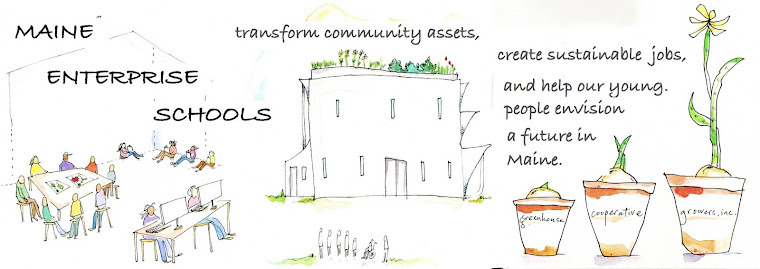Longtime Portland Educator Gary Vines sent me the website of Education|Evolving; one of the things I love about it is that the home page starts with six assertions. "Click on one of these and you will be taken to second listing of more specific assertions in that area. Click on any one of these and you will be taken to a listing of reports, newspaper clippings, audio recordings, links, etc. that we have created or made available because they explain or support that assertion."
One such sub-assertion: "a radically different model of school organization, in which the authority for arranging both the learning program and the administration of a school is placed with a formally-organized group of teachers . . . and in which the teachers accept collegially the responsibility for the school's success."
The model also asserts that the organization and governance model of the school matters a great deal - if we create communications and decision-making structures that work on a human scale, we can be genuinely accountable to our students, colleagues parents, and community. Our approach, while similar in spirit, it not entirely teacher-led; while all decisions about teaching and learning rest with the teachers (our Professional Learning Community model of curriculum implemenation, teacher improvement and advancement) we envision two other key governance elements; facilitative leadership from principals and participative citizenship from students.
Our principals are "facilitative leaders" charged with maintaining that Professional Learning Community and with connecting the work of each site to the larger network of schools (in addition to being the public face of our sites, managing reports and data and compliance, etc.). One of the key characteristics of the best replication models is that effective sharing of practice - both within schools and among similar schools - enable the teachers working in them not only to get consistently better individually, but to get better at the unique aspects of the model. In a sense, our principals are "cheif accountability officers." Technocratic as that sounds, it combines the role of head coach, ombussman, and curriculum director to ensure fidelity to the "best practices" that we are building our model on. For more on this, see Debbie Maier's article in the Summer 2005 issue of Rethinking Schools, or the websites of the School Reform Initiative or the National School Reform Faculty.
The small school structure is crucial as well to ensuring that every student is a participating citizen in the governance of the school. In addition to monthly all school, parliamentary style meetings, students are expected to develop the skills to largely self-manage school culture. Structures like civil rights teams, peer mediation, fairness committees and restorative justice systems enable student input to beyond planning dances and complaining - and at a small school, both enable and require each student to play a regular role. For more, see Everyday Democracy.

No comments:
Post a Comment